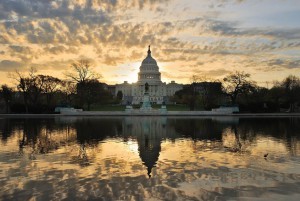On the Hill: AHA Works to Introduce International Religious Freedom Legislation

While Congress remains bitterly divided along partisan lines on many of the public policy issues facing the American people—tax reform, health care, and education reform to name a few—the American Humanist Association was able to work with both Republican and Democratic members of Congress to introduce a new resolution this week that deals with international religious freedom.
The AHA worked with Reps. Jamie Raskin (D-MD), Alex Mooney (R-WV), David Cicilline (D-RI), and John Culberson (R-TX) to introduce a resolution calling for the repeal of blasphemy laws worldwide. This resolution, H. Res. 349, encourages the president and the State Department to make the worldwide repeal of these laws a priority, while also opposing any attempts at the United Nations to support blasphemy laws.
Blasphemy laws are the most explicit laws banning the expression of doubts or criticism regarding religion, and various countries employ them to ban criticism of religious beliefs, symbols, and figures. In several countries the penalty for violating these edicts is as severe as death. Moreover, blasphemy laws harm not just the nontheistic and those without a religious affiliation, but dissidents in all religious sects; in many countries Christians, Jews, Muslims, Hindus, nontheists, and other religious minorities are imprisoned, tortured, sentenced to death, and executed for blasphemy offenses. This resolution urges countries that still maintain blasphemy laws to “amend or repeal such laws, as they provide a pretext and impunity for vigilante violence against religious minorities.”
The legislation, which was introduced in the last session of Congress by Reps. Joseph Pitts (R-PA) and Sheila Jackson Lee (D-TX), specifically mentions atheists and other secularists who have been attacked, imprisoned, and murdered for speaking about their lack of religious belief. The legislation also mentions instances were other religious minorities have faced discrimination or violence for criticizing religion or for speaking about religion in a way that offended a segment of society.
Congress has the unique ability to promote international religious freedom on the global stage and to encourage governments of countries where religious and nontheistic rights are not respected to remedy the situation. That’s why the AHA is now working on a coalition letter on behalf of theistic, nontheistic, and religious freedom organizations in support of the legislation in the hope that it will draw more co-sponsors, which in turn will increase the resolution’s chances of passing out of the House. The AHA will also be arranging lobbying meetings to educate lawmakers and their staffs about the importance of the resolution and about the current international religious freedom situation.
Humanists who would like to contact their US representative in support of the legislation may do so by utilizing the AHA’s action alert system through this link and filling out the relevant information.
